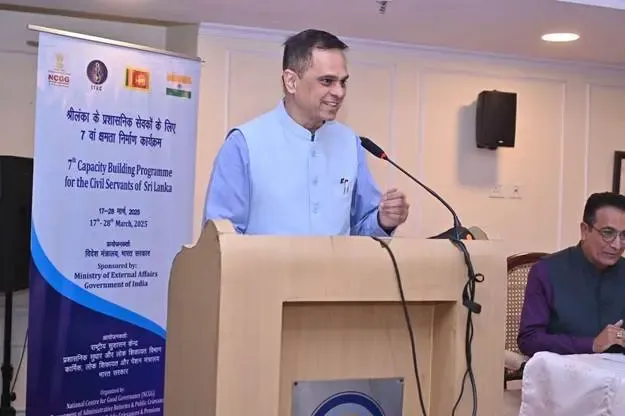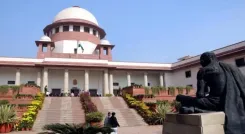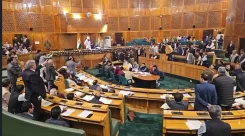Forty Sri Lankan Civil Servants Explore India's Digital Governance

Synopsis
Key Takeaways
- Insights into India's digital governance initiatives.
- Understanding of 'Maximum Governance, Minimum Government' principle.
- Overview of CPGRAMS for effective grievance redressal.
- Focus on Mission Karmayogi for civil servant capacity building.
- Participant-led case studies on critical governance issues.
New Delhi, March 29 (NationPress) A group of forty senior civil servants from Sri Lanka, including the Chief Secretary of the Uva Province, gained valuable insights into India's digital governance, a comprehensive initiative aimed at improving transparency, efficiency, and citizen-focused service delivery, as part of a capacity-building programme, an official reported on Saturday.
During the valedictory session, V. Srinivas, Secretary of the Department of Administrative Reforms and Public Grievances (DARPG), delivered the keynote address, elaborating on the concept of 'Maximum Governance, Minimum Government'. This principle focuses on simplifying administrative procedures and enhancing public service delivery while minimizing bureaucratic interference.
At the programme's conclusion on Thursday, Srinivas highlighted the Centralized Public Grievance Redress and Monitoring System (CPGRAMS), stressing its importance in improving governance through efficient grievance redressal systems.
He also discussed Mission Karmayogi, which serves as the Government of India's flagship programme for enhancing the skills and capacities of civil servants, ensuring a bureaucracy that is prepared to tackle the challenges of modern governance.
The attendees from Sri Lanka included Deputy Chief Secretary, Southern Province, Assistant Divisional Secretaries, Assistant Chief Secretaries, and Directors. They represented crucial ministries such as the Ministry of Buddhasasana, Religious and Cultural Affairs, Ministry of Fisheries, Aquatic and Ocean Resources, Ministry of Public Administration, Provincial Councils and Local Government, and others.
The capacity-building programme was conducted under the guidance of A. P. Singh, Associate Professor and Course Coordinator, alongside Dr. M.K. Bhandari, Associate Course Coordinator and Faculty at the National Centre for Good Governance (NCGG), Sanjay Dutt Pant, Program Assistant, and Monisha Bahuguna, Young Professional, among other team members.
The session featured participant-led case studies covering essential topics such as Comprehensive Health Care Scheme for Senior Citizens in Sri Lanka’s aging population, effective cadre management in the public sector focusing on Development Officers, strategies for enhancing government revenue through digitalisation, strengthening paddy farmers by introducing alternative farming practices, and tackling corruption to create a sustainable Sri Lanka.
A. P. Singh underscored the diverse range of topics addressed during the programme, which included governance, digital transformation, developmental initiatives, and sustainable practices. He also provided an overview of field visits to prestigious institutions like the Lal Bahadur Shastri National Academy of Administration (LBSNAA) in Mussoorie, Indira Gandhi National Forest Academy (IGNFA), and the Forest Research Institute (FRI) in Dehradun.
The participants also participated in district attachments in Mathura and visited the PM Gati Shakti Anubhuti Kendra in Mandapam, Pradhanmantri Sangrahalaya, the New Delhi Municipal Council (NDMC), and the iconic Taj Mahal.









